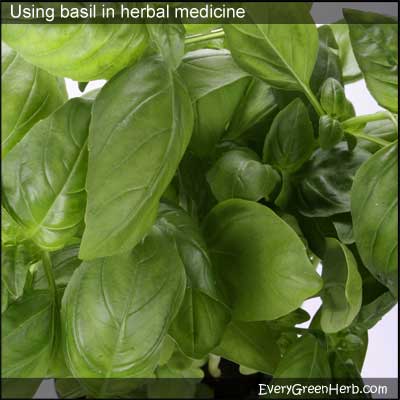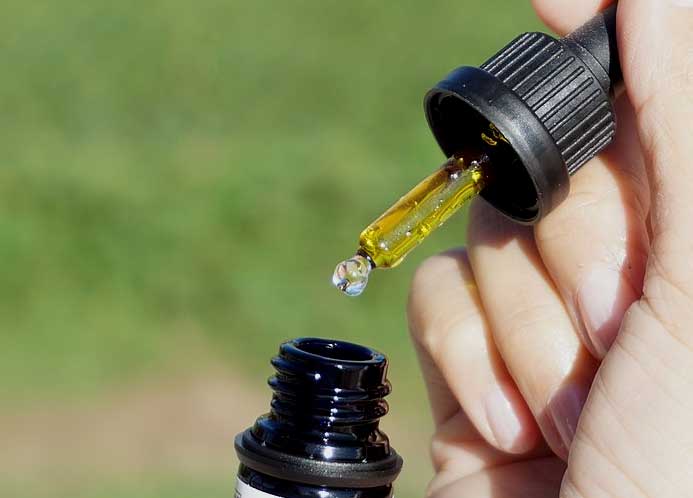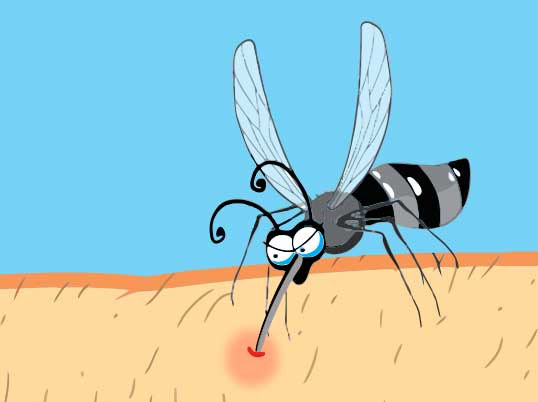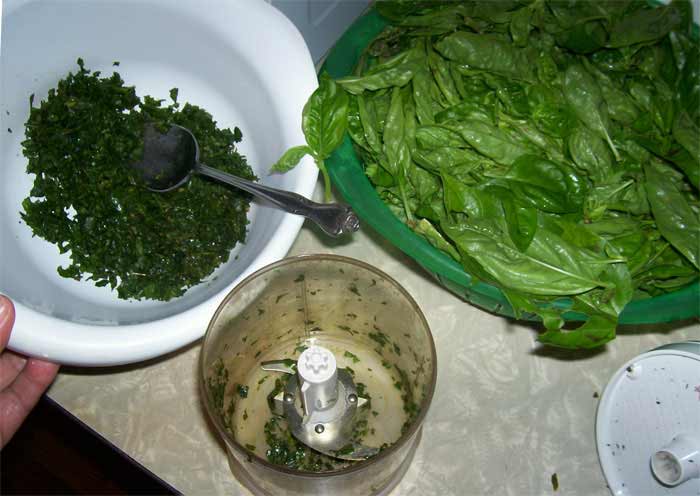Basil in herbal medicine
Basil (Ocimum basilicum) is familiar to most people, especially people that eat authentic Italian cooking. The fresh and dried leaves are used in many kitchens as a delicious culinary herb.

Basil is a big part of a healthy Mediterranean diet where it is known as the Herb of Kings.
Many chefs and cooks use basil on a regular basis in tomato dishes, and of course, pesto. A few fresh leaves can really add flavor and brighten up any dish. Besides its uses in cooking, basil is a valuable medicinal herb.
Basil is a natural remedy.
Fresh basil is used in herbal tea, poultices, and other herbal products for treating many different health problems. This uplifting herb helps everything from bug bites to depression.
Basil is used fresh, dried, and even distilled into a potent essential oil.
Basil essential oil
Basil essential oil is distilled from the flowering tops and leaves of the basil plant. The scent is light and refreshing with sweet spicy undertones.
Basil essential oil is often used in aromatherapy to treat depression and grief. It clarifies the mind.
Sniffing basil essential oil can even stop the hiccups!
Basil essential oil is used to fight mental fatigue and nervous conditions. Breathe in the scent straight from the bottle or put a few drops on a warm cloth.
In massage, basil stimulates blood flow and helps bring new vigor to tired, over-worked muscles. The herb is mentally stimulating and may be an aphrodisiac in some cases. Basil, good for circulation, gets the blood flowing.
Basil essential oil is good for headache, allergies, hay fever, and asthma.

Basil essential oil has many uses in herbal medicine.
Basil essential oil settles an upset stomach, stops nausea, soothes skin abrasions, improves digestion, relieves headaches naturally, and helps clear the sinuses.
Basil essential oil is used in the treatment of gout, skin problems like acne, and nervous disorders. It cleans the kidneys and guards against infection.
Basil can be purchased as an essential oil in most health food stores. Like most medicinal and culinary herbs, basil has a lot to offer mankind.
Basil uplifts the spirit and helps fight depression.
Basil tea makes a warming tonic that helps fight depression. Basil stimulates the adrenal cortex which regulates the stress response resulting in feeling of well-being. Many people consider basil to be spiritually uplifting.
It is useful for grounding a person that tends to be flighty or nervous.
Basil can help improve memory and is good for jet lag.
Big test coming up? Traveling by plane?
Basil tea bags fit easily into your purse or pocket and a cup of basil tea can really help. Add some rosemary for extra strength.

Basil is a good remedy for insect bites.
Basil is antiseptic and soothes itching. Leaves can be rubbed directly onto insect bites. The juice also acts as an insect repellant.
Make strong basil tea, cool, and transfer to a spray bottle. Use every hour or two to keep bugs at bay.
Use basil tincture when treating lung problems.
Tinctures made from basil can be good for coughs and bronchitis due to the plant's strong expectorant properties.
Basil is especially good for lung conditions when combined with hyssop and elecampane.
Hot basil tea can also be inhaled to help a head cold, and sipped to prevent chills.
Basil around the world
Basil is used in the treatment of kidney infection, earache, arthritis, anorexia, menstrual problems, colds, malaria, fungus infection, fever, asthma, stomachache, and diarrhea.
Basil is a traditional medicine in India where it is also used in spiritual ceremonies.
In Iran, basil is valued as both a vegetable and a medicinal tincture.
In Asia, basil seeds are an important source of fiber. The Chinese also use basil in the treatment of cancer due to the plant's high levels of polysaccarides.
What else is basil good for?
Basil has many healing properties. It is anti-spasmodic, anti-diabetic, anti-bacterial, anti-inflammatory, anti-microbal, anti-fungal, and a powerful antioxidant.
Basil has been used to treat everything from irregular menstrual periods to diarrhea.
Basil is used in the treatment of fevers and intestinal parasites.
Many herbalists gave basil tea to help patients recover from hysterectomy operations.
An infusion of basil leaves, mixed with a little motherwort, was given immediately after childbirth to prevent retained placenta. Basil imitates natural estrogen and can be used to help regulate the female system. It is well-suited for women's health concerns.
Basil stimulates the immune system.
Basil is known to stimulate the kidneys and the immune system.
It helps lower uric acid which helps relieve gout and arthritis. Basil can also help prevent vomiting and can help treat ringworm.
If you have been reading my Every Green Herb blog for a while, then you know we grow and sell a variety of herbs, but we also buy a lot, too. Try our favorite herbal suppliers for quality and value.
Basil is both a culinary herb and a medicinal herb. We love the flavor and grow it every year for making pesto. Sometimes I grow it in a pot, but we grow it in the garden, too.
Jan's Pecan Basil Pesto recipe:
Makes about 2 - 3 cups of pesto.
1/2 gallon loosely packed basil leaves
1/2 to 1 cup fresh or slighted roasted pecans
1 small garlic bulb or 2 large cloves depending on taste
1/2 cup olive or pecan oil
Salt, pepper, and parmesan cheese to taste
- Wash, dry, and finely chop basil leaves - it will reduce to about 1 - 2 cups when finely chopped.
- Stir in finely chopped pecans, chopped garlic, and olive or pecan oil - more oil may be added if desired.
- Add salt and pepper to taste.
- Sprinkle with cheese before serving.
Basil pesto is delicious served as a dip with Ritz crackers, tossed with pasta, or as a sauce for baked chicken. It is also great on pizza and buttered toast.

Basil plants are easy to grow.
Basil is easy to grow from seeds. It grows up to three foot tall in good garden soil.
Basil is related to mint, A bushy annual, it likes fertile soil but does not need to be fertilized.
Basil prefers full sun and also grows well in partial shade.
It likes soil that is kept slightly moist but not wet.
Pinch the stem tips for fuller growth.
Harvest before and during flowering.
Basil is very sensitive to cold and will turn black at the first frost. Harvest basil before frost kills it.
We chop the leaves in a food processor, mix with olive oil, then freeze in ice trays for winter use. Of course, nothing compares to fresh basil. Thank goodness it is so easy to grow in the garden, a sunny window, or on a patio.
This YouTube video, from Bonnie Plants, shows the different varieties of basil and gives growing tips:
*Basil essential oil should not be taken internally and should always be diluted with a carrier oil before applying to the skin. Basil essential oil is used in aromatherapy and occasionally in massage, but can irritate sensitive skin so use with caution. Test on a small section of skin before applying to large areas!
Large amounts of basil should not be taken for extended periods. Basil remedies should never be used in pregnancy. Always consult with your healthcare professional before using any herbal remedy or essential oil especially if pregnant, nursing, or taking other medication.
Sources:
https://www.tandfonline.com/doi/full/10.1080/10942912.2020.1828456
https://pubmed.ncbi.nlm.nih.gov/29865879/
Blessings to you and yours!
Thanks so much for reading my blog. Jan.

*Note - the information on this website has not been evaluated by the Food and Drug Administration.
© 2005-2024 website design and content by Janice Boling